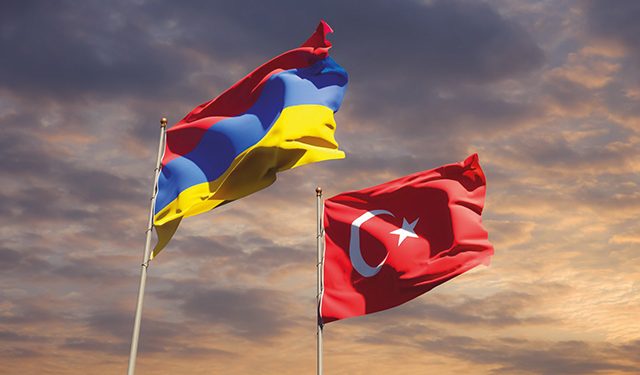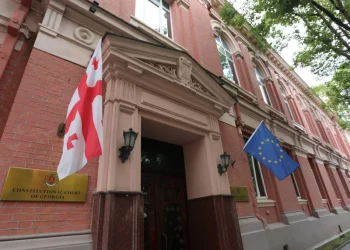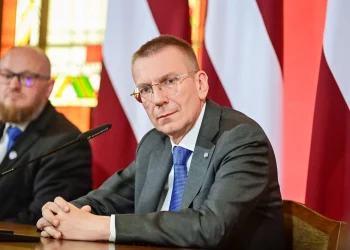Armenia and Turkey have agreed to open their borders for third-country nationals. This decision was followed by Turkish President Recep Tayyip Erdogan and the Armenia PM Nikol Pashinyan holding a rare phone talk in which both leaders expressed readiness to move ahead with the normalization process. This was not entirely unexpected, as the two countries had been consistently making positive statements and even concrete policy moves toward normalizing bilateral ties, for instance, with Armenia legally paving the way for trade with Turkey and putting normalization with Turkey as a foreign policy objective within the country’s strategic document. Statements from both sides indicate that the countries aim at the complete opening of the border with the emerging potential for restoration of diplomatic ties.
The positive trend became realistic as a result of a number of local regional and more global geopolitical developments. Azerbaijan’s victory in the 2020 war over Nagorno-Karabakh and surrounding territories, which were seized by Armenian forces in the 1990s, removed a major roadblock toward Ankara-Yerevan talks. Before the war, Turkey always argued that any improvement of bilateral ties was contingent almost entirely upon Armenia making significant concessions on the Karabakh issue.
The present momentum is also powered by more or less positive rhetoric coming from Baku, which no longer regards Armenian-Turkish rapprochement as dangerous. It nevertheless watches closely how the process develops and tries to link progress with its own negotiations with Armenia where, likewise, significant progress has been made, but still remains far from producing a definitive peace agreement.
Turkey’s activism in all this is noteworthy, and is based on Ankara’s dynamic eastern foreign policy, specifically in the South Caucasus. After the 2020 war, Turkey has been especially keen to help reshape the geopolitics of the South Caucasus. It pushes for normalization with Armenia and supports a similar trend in Armenia-Azerbaijan talks. The Turkish leadership is also intent on creating additional trade corridors to the Caspian Sea and Central Asia through Armenia.
The momentum is there. Russia’s aggression against Ukraine changed the patterns of Eurasian connectivity. The effective Russia route which, for decades, helped connect China with the EU market, has collapsed. The need to find alternative roads has increased and the Middle Corridor, stretching from the Black to the Caspian Sea and Central Asia, could serve as a substitute. Turkey is actively supporting the idea and, along with the route through Georgia, it sees the emerging rapprochement with Armenia as yet another possibility to expand the Middle Corridor.
It is still hard to tell whether the normalization process will be successful. A number of obstacles remain, and a major problem is the internal Armenian situation. The opposition and Armenian diaspora are staunchly against rapprochement with Turkey. And though these two actors have so far failed to mount a decisive offensive against Pashinyan, they nevertheless can from time to time complicate the internal political process in Armenia.
The second problem is Russia. It is still unclear how Russia benefits from the Armenia-Turkey normalization. Moscow has seemingly supported the improvement of ties, but it is also clear that the Kremlin is uneasy. Indeed, for Moscow, Armenia’s isolated position between Azerbaijan and Turkey always presented opportunities: Yerevan was an unequivocal ally of Moscow. Now, Armenia could potentially look Westward toward Turkey and use its ports to reach the EU market and actually balance its overdependence on Russia.
Yet, Armenia-Turkey normalization is unlikely to signal the end of Russia’s influence in Armenia. Russian troops will remain in the country, and deep economic connections will persist. But, over time, the Turkish alternative will inevitably bite into Russia’s clout, balanced with economic opportunities emanating from trade with Turkey.
Another critical element when calculating what Russian perspective on Armenia-Turkey relations could be is the war in Ukraine. Russia now might be more tolerant of Turkish inroads into the South Caucasus because of its military preoccupation elsewhere. The Kremlin simply might not have enough political and economic power to prevent Ankara’s moves. Moreover, it also needs Turkey’s at least neutrality over the war in Ukraine.
Ankara sees and is cleverly using this moment to push for accelerated improvement with Armenia because potential Russian victory in Ukraine would tip the balance back in Moscow’s favor. For the Kremlin, Turkey’s activism presents too many unknown variables entering the geopolitical game in the South Caucasus. Accustomed to exclusive domination of this geographic space, there are now growing indications that Turkish influence has turned into a constant the Kremlin cannot ignore. It is just the extent to which Russian leadership are able modify Ankara’s increasing potential. Better allow the Turks in and reshape their ambitions rather than deny them the space for movement, the latter increasingly seen in Moscow as a long-gone option.
Russia and Turkey, despite their history of 12 wars, are now seen as powers who well understand each other, more or less respect each other’s red lines, and are religious about the concept of regionalism, i.e. limiting non-regional actors in the Black Sea, Syria and the South Caucasus. Yet, inherently, the geopolitics dictate that Turkey is more interested in Russia’s further diminished influence. And this is where Ankara and the West have overlapping interests. The Middle Corridor, the territorial integrity of Georgia and Azerbaijan and a number of other security issues are focal issues Turkey and the West can agree and expand upon.
Thus, Armenia and Turkey are likely to continue their normalization progress. We might see a full-scale improvement of ties, but much will depend on how Russia tolerates the progress and what will come out of Baku-Yerevan peace talks.
Emil Avdaliani is a professor at European University and the Director of Middle East Studies at the Georgian think-tank, Geocase.
Analysis by Emil Avdaliani













